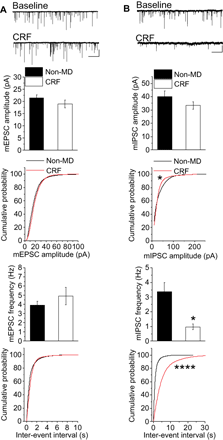Stress, The Brain and Behavior
March 7, 2018
- By Michael E. Authement*, Ludovic D. Langlois*, Ryan D. Shepard*, Caroline A. Browne, Irwin Lucki, Haifa Kassis, and Fereshteh S. Nugent†
-
Department of Pharmacology, Uniformed Services University of the Health Sciences, Bethesda, MD 20814, USA.

Stress hormones, such as CRF (also known as CRH), inhibit the "reward" signals provided by dopamine signaling in the brain after or in anticipation of a given action. Potentially because of this, severe or chronic stress is associated with depression and can impair decision-making, and early-childhood stress is linked to long-term mental health problems and behavioral disorders. Authement et al. found that CRF exposure in slices or maternal deprivation in pups decreased the abundance of K+ channels, which increased the excitation of neurons in the lateral habenula (LHb), a region of the brain that suppresses dopaminergic circuitry. Maternal deprivation in rats blunted the response of LHb neurons to subsequent, acute stress (CRF exposure), indicating some permanence to the circuitry effects. Blocking the kinase PKA, which mediated these effects, might be therapeutic in patients with abnormal, stress-associated LHb activity.